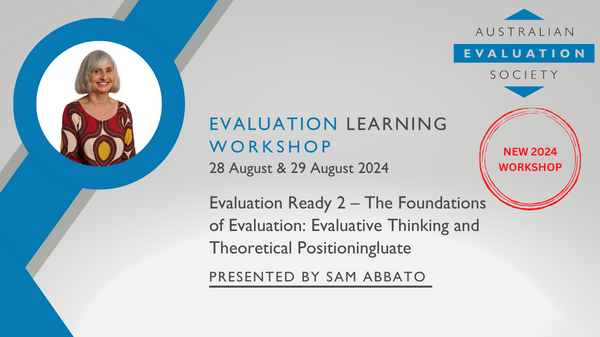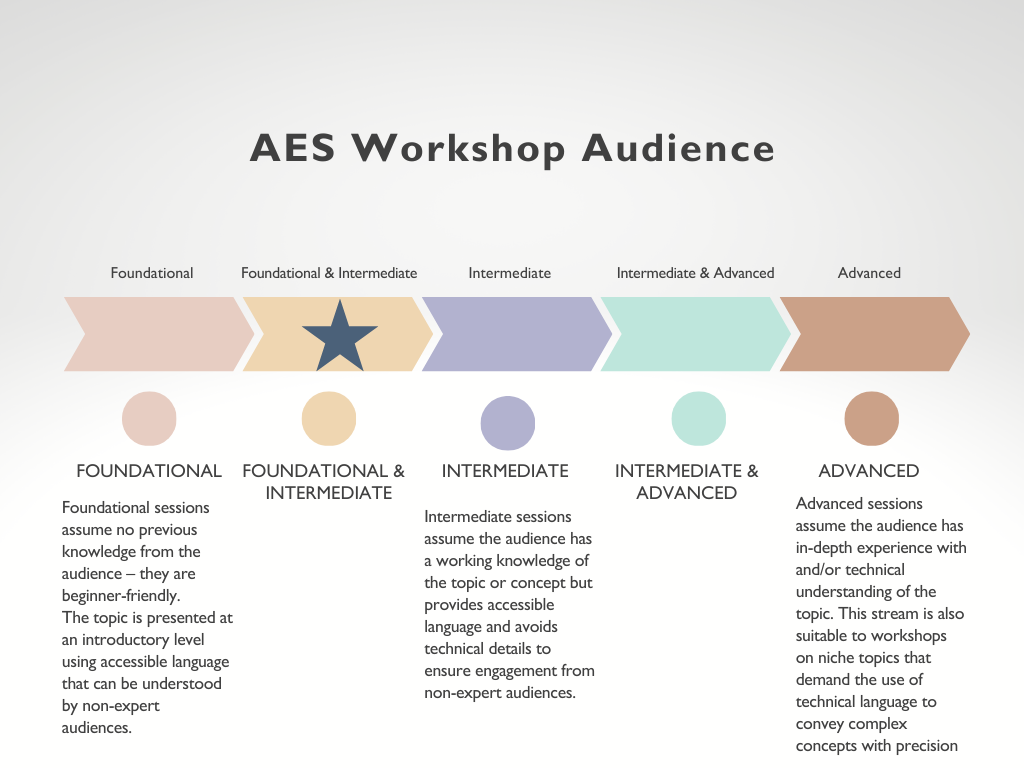Workshop: Evaluation Ready 2 – The Foundations of Evaluation: Evaluative Thinking and Theoretical Positioning (Online 28 & 29 August 2024)

Workshop: Evaluation Ready 2 – The Foundations of Evaluation: Evaluative Thinking and Theoretical Positioningluate
Date and time: Wednesday 28 August and Thursday 29 August 2024 9.30am to 1.00pm AEST (registration from 9.15am) Registrants are to attend both sessions. (full day workshop - 2 sessions)
Venue: Via Zoom. Details will be emailed to registrants just prior to the workshop start time
Facilitator: Dr. Samantha Abbato
Register online by: Tuesday 27 August 2024. Spaces limited to 25 participants
Fees (GST inclusive): Members $325.00, AES Organisational member staff $460.00, Non-members $535.00, Student member $155.00, Student non-member $250.00* (GST inclusive) *Students must send proof of their full-time student status to
Workshop Overview
Evaluation is much more than planning, doing and reporting. The ability to think evaluatively is essential. As Michael Patton puts it, “Evaluation is an activity. Evaluative thinking is a way of doing business” (Patton, 2017).
As important as the capacity to think evaluatively is the ability to situate what we do as evaluators and the methods we use within a broader framework of theory, worldview and belief systems. The ability to theoretically frame our work and acknowledge the political nature of evaluation activities is critical to our responsibilities and credibility as evaluators. It is an enabler of better practice and more impactful evaluation products.
This workshop aims to provide participants with two foundational pillars to strengthen the way they do evaluations: 1. Evaluative thinking and 2. Theoretically framing.
The workshop will be interactive, sharing experiences and hands-on activities supported by diagnostic tools, checklists, cartoons and flashcards. Throughout this practical workshop, participants will be supported in working on their skills and readiness by completing applied activities and participating in presentations and group discussions. Case studies from the presenter's experience in health, communities, Aboriginal and Torres Strait Islander, and culturally and linguistically diverse settings will be discussed. Participants will be provided opportunities to apply new skills to their work. They will take away practical tools that they can use again..
Workshop Content
The workshop comprises two main areas of focus: Evaluative thinking and theoretical positioning.
1. Evaluative thinking–Building on Cole's five elements of evaluative thinking (critical, contextual, creative, practical thinking and reflexive practice) (Cole, 2023), we introduce a checklist of the features, habits, values, enablers and threats to evaluative thinking. Participants will explore the strengths and challenges in their own thinking and identify actions for improving it. Together, we investigate the impact of limitations in evaluative thinking on the evaluator and other stakeholders’ readiness to do the evaluation.
2. Theoretical grounding, worldview and political context–Become familiar with the four components for placing, communicating and understanding evaluation approaches and methods including understanding the nature of our– 1. Values and ethics (axiology), 2. Reality and the way we see the world (Ontology), 3. Knowledge claims (Epistemology) and 4. Systematic enquiry (Methodology). Using this framework with real-world examples, we provide the knowledge and tools to help you articulate the theory and worldview shaping your own evaluation approach and methods. The political context in which evaluators do evaluation is another major influence on how evaluations get done, are communicated and reported. Participants will be provided with frameworks and tools to articulate, explore and navigate the impact of the stakeholders’ power positions and information needs on their evaluation processes.
In a final session, we combine the learnings of the two focus areas to build our readiness to discuss and identify actions to communicate our positioning, principles and responsibilities to others from evaluation planning discussions with stakeholders and intended evaluation users to reporting evaluation findings.
Workshop Outcomes
The workshop learning outcomes include:
• Practical skills in assessing evaluative thinking and increasing the ability to think evaluatively.
• Identifying and articulating the theoretical placement and worldview of evaluation approaches and methods.
• Strengthening skills in positioning and communicating our evaluation responsibilities to others.
PL competencies
This workshop aligns with competencies in the AES Evaluator’s Professional Learning Competency Framework. The identified domains are:
-
Domain 1 – Evaluative attitude and professional practice
-
Domain 2 – Theoretical foundations
-
Domain 3 – Culture, stakeholders and context
-
Domain 4 – Research methods and systematic inquiry
This workshop is designed for professionals who conduct or commission evaluations. This workshop is classified as ‘foundational and intermediate’. Beginners and those new to evaluation will also benefit most. It will also be of value to those at an intermediate level who want to explore evaluative thinking further, more effectively position their evaluation work theoretically, and communicate their responsibilities as evaluators to others.

About the facilitator
Dr Samantha Abbato has more than twenty-five years of health and community sector experience and strong methodological expertise across qualitative and quantitative disciplines, including public health, epidemiology, medical anthropology, biostatistics, and mathematics. Sam engages in a utilisation-focused approach, mixed (qualitative and quantitative) methods, and evaluation case studies and stories for building evaluation capacity and making a difference in the health and community sectors.
Workshop start times
-
VIC, NSW, ACT, TAS, QLD: 9.30am
-
SA, NT: 9.00am
-
WA: 7.30am
-
New Zealand: 11.30pm
-
For other time zones please go to https://www.timeanddate.com/worldclock/converter.html
Event Information
| Event Date | 28 Aug 2024 9:30am |
| Event End Date | 29 Aug 2024 1:00pm |
| Cut Off Date | 27 Aug 2024 4:00pm |
| Location | Zoom |
| Categories | Online Workshops |
